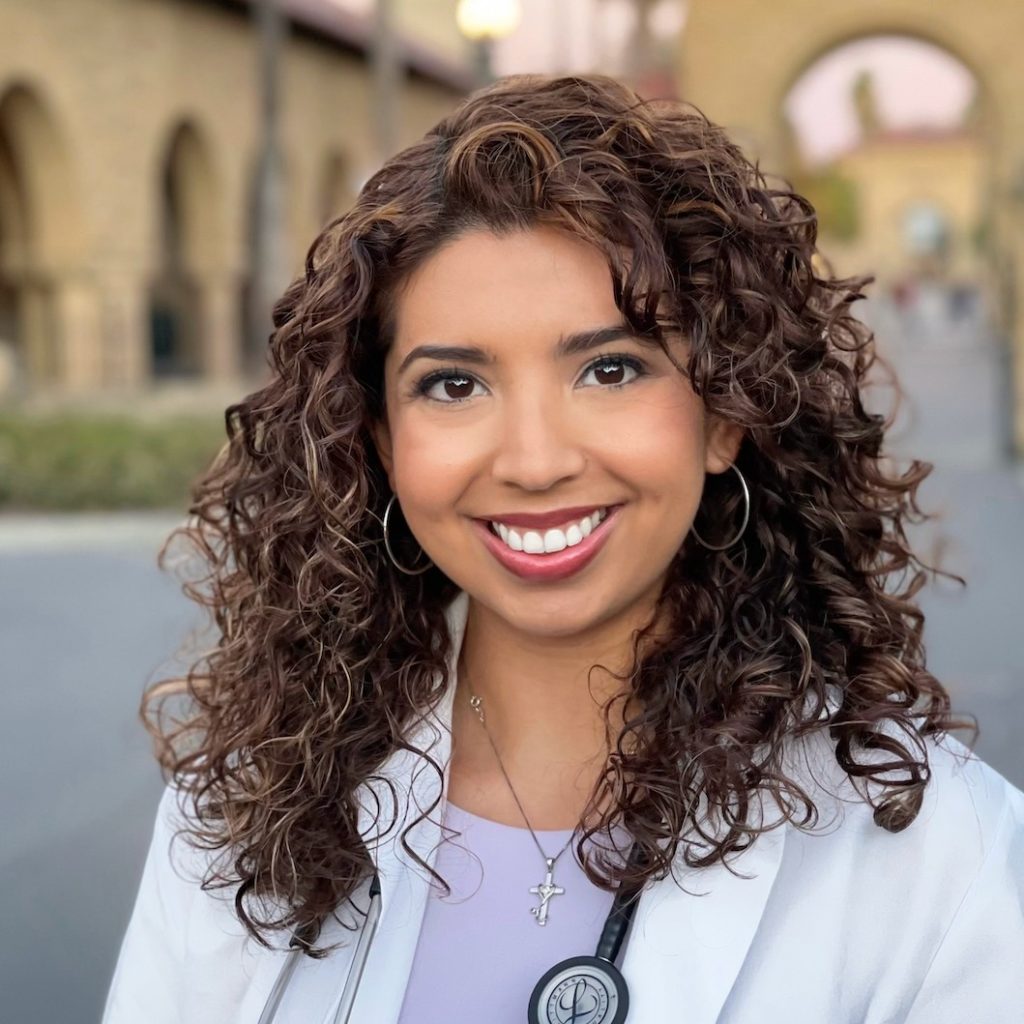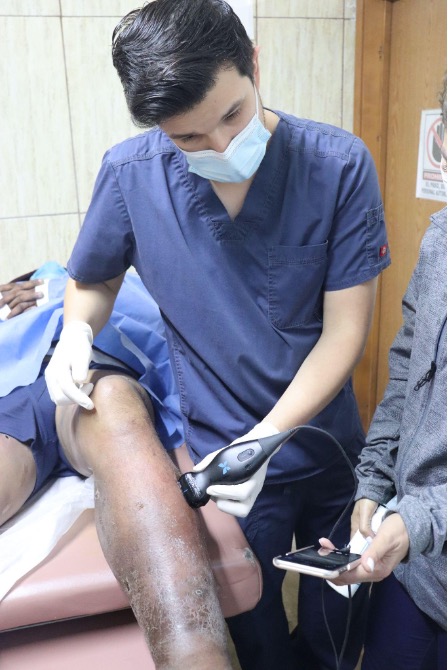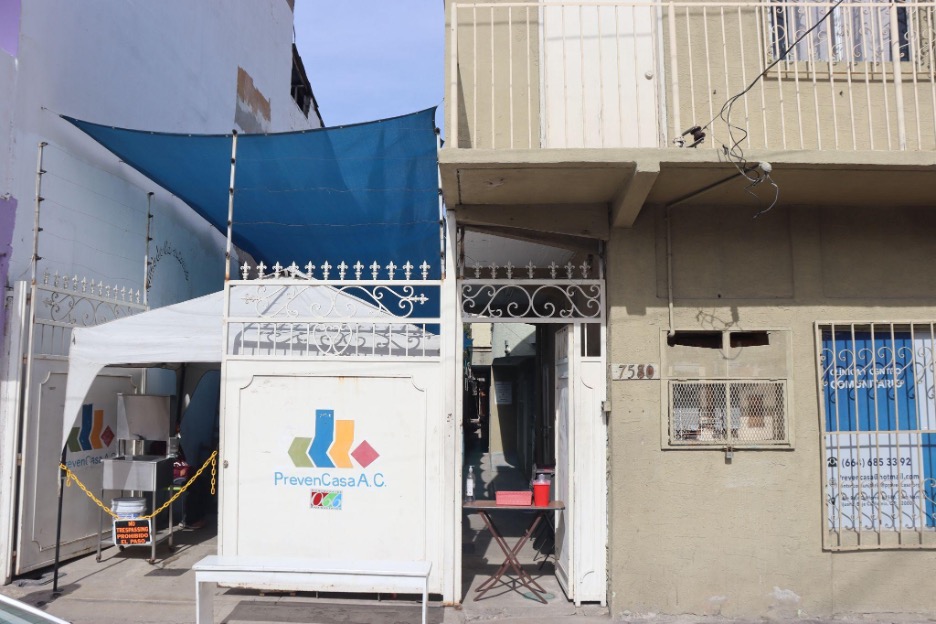Published: 01/12/2023
How U.S. volunteer doctors are treating migrant women stuck at the border between the U.S. and Mexico

By Janelle Chavez, Stanford Global Health Media Fellow
TIJUANA, Mexico- I sit in a small patient exam room in a migrant health clinic in Tijuana, Mexico. A 43-year-old Haitian woman, “Maria,” is here to be evaluated for abnormal bleeding due to uterine fibroids. I ask the standard questions about her symptoms. A few minutes into the encounter, she reveals intense feelings of depression and intrusive thoughts about ending her life. She cries about the harassment she has faced living on the streets. When asked about what keeps her going, she says her kids and the thought of uniting with family in Miami.
Maria’s story is one all too common among migrants seeking asylum in the United States. Due to arduous treks across thousands of miles, health and psychological issues culminate with little to no access to medical care.
As a Stanford medical student, I have had the opportunity to volunteer at refugee health clinics in Tijuana, Mexico with Families at the Border, a non-profit organization of Stanford medical professionals dedicated to the wellbeing of migrants. The group provides medical training and education, donations, and advocacy to support migrants in need. Having grown up in the Rio Grande Valley along the Texas-Mexico border, I was drawn to the work of these physicians.
Dr. Kay Daniels, Stanford OBGYN and a leader of the Families at the Border group along with Drs. Lisa Chamberlain and Maggi Smeal, became involved with efforts at the California border when she heard about an influx of underserved migrants around 2019.
“This problem with the border is caused by US policies, so we as US citizens have an obligation to help,” Daniels said.
Due to restrictive immigration policies enacted in recent years, such as Title 42 and the Migrant Protection Protocols, many migrants seeking asylum in the US have been turned away at the southern border and forced to wait in Mexico.
Volunteering in Tijuana has been one of the most meaningful experiences in my life. I can’t help but reflect on individuals like Maria who made long, dangerous journeys in search of a better life, [and] I hope that we can continue to advocate and care for those in need.
Janelle Chavez
“Tijuana is a city that receives a large flow of migrant population which is extremely vulnerable for different reasons, socially, politically, economically. And here, a lot of those problems concentrate,” said Dr. Alex Gonzalez, medical director of Prevencasa, a non-profit clinic providing free medical care to vulnerable populations in Tijuana.

Most migrants come from Honduras, Guatemala, and El Salvador– countries that have been burdened by economic, social, and political instability in recent years. There has also been an influx of migrants from Haiti, a country that has faced several devastating challenges, including natural disasters and the assassination of its president in 2021.
Migrants are forced to live in concentrated makeshift border encampments with inadequate food, shelter, and medical care. In 2021, hundreds of migrants crowded El Chaparral border crossing, with families living in donated tents without bathrooms or sanitation, vulnerable to dangerous violence in the area. With extremely limited resources, refugee health clinics like Prevencasa serve as the sole providers for many migrants.
In just one November morning at the clinic, we diagnose a 19-week pregnancy for a Haitian migrant woman using a small ultrasound connected to an iPhone and send her to a group of volunteer midwives for prenatal care. Another post-menopausal woman with a history of uterine cancer presents with abnormal bleeding for months, a concerning sign of relapse. We send her to the Tijuana General Hospital for further evaluation. A 27-year-old woman comes with a large recurrent cyst on her vulva. She had been turned away from many hospitals in Tijuana, and the cyst was too large to drain in the clinic. We work with lawyers at Al Otro Lado, an organization that provides legal and humanitarian aid to refugees in Tijuana to facilitate her getting medical care in the United States. We provide prenatal care for a 22-week pregnant patient with a large uterine fibroid that will undoubtedly complicate her pregnancy, potentially requiring a cesarean section to save her and her baby’s life.
This is a typical morning at the refugee health clinics where patients line up before doors open. At Prevencasa, Dr. Gonzalez is gratified by this work and strives to treat these populations with compassion.

“I feel compelled to help them,” said Gonzalez. “To try to give them high-quality care and make them feel heard, understood, and that they feel especially that they are people with the same rights as any other person and that we don’t forget about them.”
In addition to medical aid, the providers at these clinics work with a group of lawyers at Al Otro Lado to facilitate care for serious medical conditions that require treatment in the United States. Dr. Daniels recalls a pregnant woman whose unborn child had a structural kidney disease that could not be cared for in Mexico.
“We wrote letters, we worked with Al Otro Lado, and we actually got her over the border so that she could be delivered over the border and her baby could be saved,” Daniels said. “Because if her baby had been born here, it would’ve died.”
For Daniels, this kind of work is a calling.
“We’re a nation of immigrants. Except for Native Americans, everybody can point to what relative of theirs came over,” Daniels said.
“How dare we not help the next group that wants to come in,” Daniels asked. “So that’s what I would hope is that we in the US start incorporating our future citizens in our future.”
Volunteering in Tijuana has been one of the most meaningful experiences in my life. I can’t help but reflect on individuals like Maria who made long, dangerous journeys in search of a better life. I think about the doctors, lawyers, and volunteers that work to facilitate these missions. I hope that we can continue to advocate and care for those in need.
Featured image: Dr. Daniel De Torre takes a patient blood sample to evaluate for transmissible diseases like HIV (Janelle Chavez)